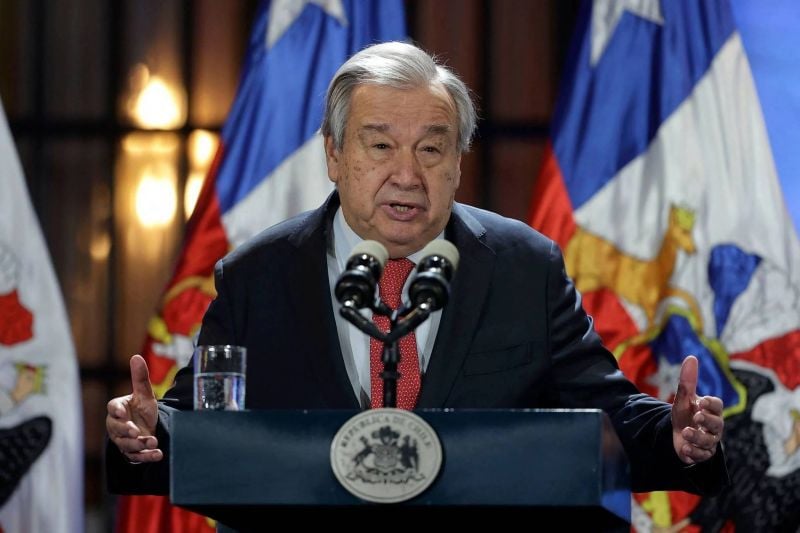
United Nations Secretary-General Antonio Guterres. (Credit: Raul Bravo/AFP)
In his 39th assessment report on the implementation of UN resolution 1559 (2004), UN Secretary-General Antonio Guterres reiterated his “concern at the intensification of exchanges of fire” on the southern border during the period from Oct. 21, 2023 to Feb. 20, 2024. “Hezbollah's maintenance and use of significant and sophisticated military capabilities beyond the control of the Lebanese government remains a matter of grave concern. The widespread presence of weapons beyond the control of the state and the activity of several Lebanese and non-Lebanese armed militias continue to undermine security and stability in Lebanon. These developments underline the urgent need to implement all the provisions of resolution 1559. Calls by Lebanese parties for the full implementation of the said resolution and for the rejection of the presence of weapons outside the authority of the State indicate that Hezbollah's arsenal remains a divisive issue within Lebanese society.”
Adopted in 2004, Resolution 1559 calls for the withdrawal of foreign forces from Lebanon, the disarmament of all militias and the extension of government control over all Lebanese territory. The Security Council called for “the disbanding and disarmament of all Lebanese and non-Lebanese militias, a key provision of the resolution that has not been implemented. This provision reflects a decision to which all Lebanese committed themselves in the Taif Accords," recalled the UN Secretary-General in this report.
The UN Security Council will meet on May 8 in closed consultations, under the presidency of Mozambique, to examine this latest semi-annual report. The UN Under-Secretary-General for Political Affairs and Peacebuilding, Rosemary DiCarlo, will give a briefing on the main recent developments in Lebanon. In the Security Council, “France is the pen of Lebanon.”
Following the Hamas attack on Israel on Oct. 7, 2023, the situation along the Blue Line on the southern border has worsened. This raises serious concerns about a major escalation. In his report, the UN Secretary-General also observed that this situation “created new areas of unexploded ordnance contamination,” posing a threat to civilians on both sides of the Blue Line and to UN personnel. The intensification and geographical scope of the strikes, and statements by Israeli and Hezbollah officials, raise the prospect of a conflict of “considerable magnitude” and “in-depth strikes in Lebanon and Israel that could trigger an even more serious confrontation,” warned Guterres. He “strongly condemns all violations of Lebanon's sovereignty and territorial integrity” and notes that Israeli strikes “undermine security and exacerbate tensions.” He calls on Israel to respect its obligations under international law and Security Council resolutions, in particular by “immediately ceasing its overflights of Lebanese airspace.”
Presidential vacuum and 'anti-refugee sentiment'
While Lebanon has been without a president since Oct. 31, 2022, the UN chief believes that “the country's multidimensional crisis can only be resolved through the election of a President of the Republic, the formation of a full government and the implementation of comprehensive reforms that meet the needs and aspirations of the Lebanese people.”
Regarding the presence of Syrian refugees and migrants on Lebanese territory, the UN chief notes that anti-Syrian sentiment, measures and incidents remain a source of concern in Lebanon, “which hosts the highest number of refugees per capita in the world.” He calls on the international community to continue to provide the necessary support, notably by increasing resettlement quotas. “The application of legal and procedural guarantees, including the principle of non-refoulement, remains essential,” he stresses.
The consensus among Council members in favor of Lebanon's sovereignty, territorial integrity and security is clear. They remain keen to avoid large-scale conflict between Israel and Hezbollah. However, differences persist between council members on the subject of Hezbollah. Some distinguish between the political and military wings of the group and have designated only its military wing as a terrorist organization. Others, including the United Kingdom and the United States, have classified Hezbollah in its entirety as a terrorist organization. Russia, on the other hand, considers Hezbollah a legitimate force.
This article originally appeared in French in L'Orient-Le Jour.